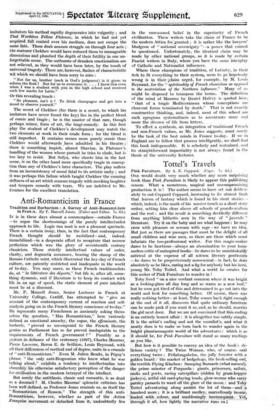Anti-Romanticism in France
Tradition and _Barbarism : A Survey of Anti-Romanticism in Frame. By P. Mansoll Jones. (Faber and Faber. 7s. 6d.)
IT is in these days almost a commonplace -outside France to argue the shortcomings of the purely intellectualist approach to life. Logic run mad is not a pleasant spectacle. There is a certain irony, then, in the fact that contemporary French thought should be mobilized—and, indeed, immobilized—in a desperate effort to recapture that narrow perfection which was the glory of seventeenth century classicism. Those strictly intellectual values of order, clarity, and dogmatic assurance, bearing the stamp of the Roman Catholic mint, which illustrated the hey-day of French culture, are patently restricted and inadequate in the world of to-day. You may sneer, as these French traditionalists do, at " la litterature des departs," but life is, after all, some- thing dynamic, and if literature is to keep its contact with life in an age of speed, the static element of pure intellect must be at a discount.
Mr. P. Mansell Jones, Senior Lecturer in French at University College, Cardiff, has attempted to " give an account of the contemporary current of reaction and self- analysis going on in the French literary conscience of to-day." He represents many Frenchmen as anxiously asking theme selves the question, " Has Romanticism," here variously defined as emotional anarchy, the vague, the effeminate, the barbaric, " proved as uncongenial to the French literary genius as Parliament has so far proved inadaptable to the requirements of French government " Possibly as a gesture in defiance of the centenary (1927), Charles Maurras, Pierre Lasserre, Baron E. de Seilliere, Louis Rey-naud, with all their differences of method and of degree, unite in a crusade of " anti-Romanticism." Even M. Julien Benda, in Peguy's phrase " the only anti-Bergsonian who knew what he was talking about," exhibits a tendency to intellectualize into absurdity his otherwise satisfactory perception of the danger for civilisation in the modern betrayal of the intellect.
But surely the antithesis, classic and romantic, is as dead as a doornail ? M. Charles Maurras' splenetic criticism has been well defined, as Professor Jones reminds us, as itself the " Romanticism of, Reason." The strength of this anti- Romanticism, however, whether as part of the Action Francaise movement• or detached from it, - undoubtedly lies in the unreasoned belief in the superiority of French civilization. These writers take the claim of France to be the modern Attica for; granted ; it is rather like the lawyers' bludgeon of " national sovereignty "—a power that cannot be questioned. Unfortunately, the identical claim may be made by other national groups, as it is made by certain Fascist writers in Italy, where you have the same interplay of Catholic and Nationalist influences.
Where these champions of tradition, of Latinity, in their itch to fit everything to their system, seem to go hopelessly wrong is in their !claim urged, for example, by M. Louis Reynaud, for the " spirituality of French classicism as opposid to the materialism of the Northern influence." • Many of IN, might be disposed to transpose the terms. The definition of the mind of Maurras by Daniel Halevy is quoted here, " that of a tragic Mediterranean whose conceptions are clear-cut forms terminated by death." That is not exactly constructive thinking, and, indeed, most of this school are such egregious systematizers as to accentuate more and more the divorce of life from letters.
To effect a synthesis, an integration of traditional French and non-French values, as Mr. Jones suggests, must surely be the task of the best minds in France to-day. If we in England are to follow that process intelligently, we shall find this book indispensable. It is scholarly and restrained, and its straightforward impartiality is not' always found in the thesis of the university lectnrer.


























































 Previous page
Previous page